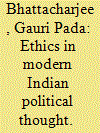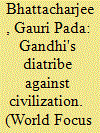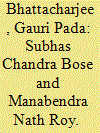| Srl | Item |
| 1 |
ID:
130789


|
|
|
|
|
| Publication |
2014.
|
| Summary/Abstract |
Political _thought is concerned with the state, and the sovereign power of the state is legally unlimited, though it is not arbitrary. It is exercised with the objective of realizing some interest of the state. With the rise of the concept of democracy there arose, not only the importance of the individual but also the long struggle between state sovereignty on the one hand, and individual freedom on the other, ultimately giving rise to the concept of democracy. Democracy does not mean s-imply majority rule. It implies majority rule with full rights of all. The simple view of majority rule gave rise to the misleading concept of democratic dictatorship, and in a democracy an individual, even if he becomes a minority of one, is entitled to enjoy all the rights embodied in the constitution. Democracy therefore implies rights of all and rule by the majority opinion as ascertained periodically.
|
|
|
|
|
|
|
|
|
|
|
|
|
|
|
|
| 2 |
ID:
130003


|
|
|
|
|
| Publication |
2014.
|
| Summary/Abstract |
Gandhi was opposed more to the English rule than rule by the Englishmen, and the nationalists sought to expel the Englishmen retaining the modern rule introduced by them. What was the drawback of the English rule? According to Gandhi their drawback was to bring modern civilization to India. Both the nationalists and the Mahatma sought to end British rule in India - the nationalists because it was foreign, and the Mahatma because it was modern. "It is not due to any particular fault of the English people," Gandhi asserted, "but the condition is due to modern civilization." "It is civilization only in name. Under it the nations of Europe are becoming degraded and ruined day by day," he added. And Gandhi was convinced that "if India copies England … she will be ruined." He thought that modern civilization "is eating into the vitals of the English nation," and therefore instead of blaming the English we should sympathize with them in their present distress caused by modern civilization. He was however confident that the English people would soon "cast off the evil" of modern civilization which, in his opinion, was not an "incurable disease."
|
|
|
|
|
|
|
|
|
|
|
|
|
|
|
|
| 3 |
ID:
136849


|
|
|
|
|
| Summary/Abstract |
Manabendra Nath Roy and Subhas Chandra Bose were two outstanding leftist leaders of the national struggle for India’s independence. Roy was older than Bose by ten years, and both were active in the national politics of India in the Gandhian period. Both Roy and Bose revolted against the Gandhian leadership, both sought to take advantage of the international situation to promote the national struggle, and both tried to enrich the national movement of India by lofty socialist ideals.
|
|
|
|
|
|
|
|
|
|
|
|
|
|
|
|